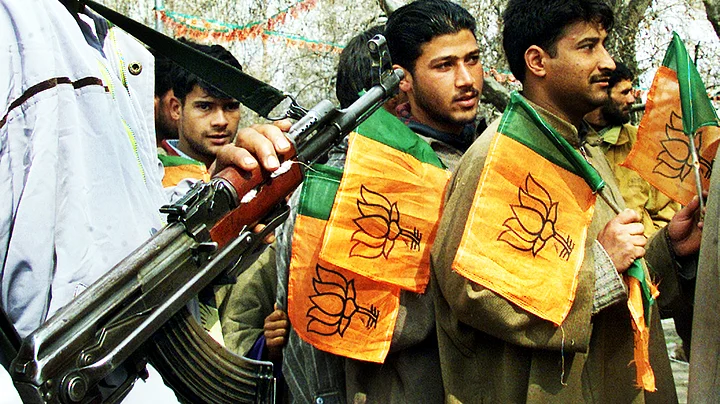The bedlam that erupted in Kashmir on Saturday should be a wake up call. At one level, it is a tragic result of the time and opportunity that was wasted last year in the petty point scoring between the BJP and the PDP, the main coalition partners in the Jammu and Kashmir state government.
Despite warning the political strategists who run the government, they did not realise just how much of a tinder box Kashmir had become. At least now it should be obvious. In light of the extraordinary fury over the lack of flood relief in 2014 and the general anger over the cynicism, repression and corruption of the Omar Abdullah government, the new government of 2015 should not have wasted a single moment in reaching out to the people.
Instead it was bogged down by an ugly face off between the main coalition partners from the very first day. The BJP must take the major share of responsibility for not facilitating the smooth functioning of the state government. Starving the state government of funds and forcing the then chief minister Mufti Mohammed Sayeed to repeatedly seek the release of promised grants while he was on his death bed was terribly ill advised.
Listen to Protestors as Indian Citizens
Allowing BJP and RSS cadres to raise divisive and counter productive Hindutva issues such as a beef ban and not respecting the constitutionally sanctioned state flag were terrible errors in political judgement.
In matters of national interest, security concerns must be given priority over trying to score political points to please people. Statements by the political class, including the government, indicated that the administration was still addressing its core political constituency instead of responding to the protestors in Kashmir. To say that no ‘Indian can back a terrorist’ is easy, but the call of duty is to listen to protestors as Indian citizens.
An empathetic response would take into account that Burhan, whose killing on Friday caused the current wave of protests in Kashmir, became a recognised face after security forces killed his brother Khalid on 13 April 2015- just few weeks after Mufti Mohammed Sayeed came to power. The latter’s body was brought home without a lower jaw, teeth, eyes, nose and ears. The horrendous torture caused a wave of revulsion across the valley and sympathy for the younger brother who had been a largely unknown militant in 2010.
Most people across India did not take into consideration just how much Burhan’s image shot meteor like in the public imagination in Kashmir last year. His handlers in Pakistan did. He was quickly designated divisional commander of Hizbul Mujahidin for South Kashmir. Video recordings of a pleasant-faced man had an unprecedented impact on drawing new recruits to militancy.
Reach out to Burhan’s Family
It is a blow to national interest that some branch of the state apparatus did not reach out to Burhan and his family with sympathy after Khalid’s horrific killing. That could have substantially tempered public outrage.
But the ruling establishment in Delhi viewed militancy and the measures to counter it in black and white terms. Given the unease within the coalition last summer, no one in the PDP dared to do the right thing, which was to reach out to try and win over the young man. As PDP president, Mehbooba Mufti was uniquely placed to have reached out to him while her father was chief minister. She would have had legitimacy too, since she was the MP from South Kashmir, the area in which Burhan operated.
Whatever his crimes, he remained a citizen from her constituency. But coalition tensions snuff out any such possibility.
The Healing Touch Policy
Mehbooba has run the coalition smoothly since she became chief minister in March. BJP leaders too have been careful not to rock the boat. This is all good, but it may be too little too late. For the PDP is now cast in the role of a pro-Hindutva party. It is seen as an undependable option to safe guard Muslim interests.
Even now it would be in the nation’s interest, if top central leaders were to give Mehbooba the green signal to reach out with what her father used to call a ‘healing touch’. The approach should be secular and inclusive but must positively acknowledge the issues about which people feel strongly. Human rights abuses such as the killing and torture of Khalid must be addressed. After all, Khalid was not a militant. Security forces caught him while he was reportedly returning after a clandestine meeting with his younger brother Burhan.
Kashmiris Will Respond to Genuine Gesture of Goodwill
Generally speaking, Kashmiris are emotional. That explains the huge gatherings at Burhan’s funeral and the demonstrations that followed. The flip side is that the people respond to a genuine gesture of goodwill.
The unilateral ceasefire by armed forces during Ramzan which prime minister Atal Bihari Vajpayee had announced at the peak of what was then a proxy war around the turn of the millennium is still remembered fondly in the valley. The fact that Vajpayee is the Indian leader most respected and even loved in Kashmir shows that an RSS connection need not be an insurmountable block to reach out to Kashmiris.
It is fortunate that the current chief minister has invested much energy and goodwill over the past couple of decades to reach out inclusively to the alienated people in Kashmir. This could still turn into an opportunity. It would be truly tragic if the ruling establishment does not make the best of it.
(David Davadas is a Kashmir expert and geo-political analyst. The piece was narrated to The Quint over the phone, since internet connectivity continues to remain down in the region amidst violence)
